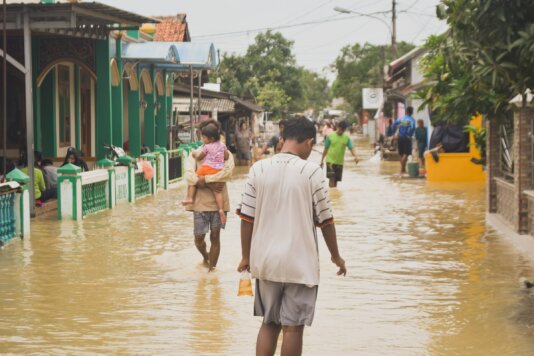- About
- Topics
- Picks
- Audio
- Story
- In-Depth
- Opinion
- News
- Donate
-
Signup for our newsletterOur Editors' Best Picks.Send
Read, Debate: Engage.
| topic: | Climate action |
|---|---|
| tags: | #climate crisis, #climate action, #climate refugees, #global-warming |
| located: | India, Pakistan, USA |
| by: | Steve Trent |
The climate crisis is knocking on everyone’s door. But for some, it has already kicked it down.
Extreme weather and natural disasters forced 30.7 million people from their homes in 2020, and up to 132 million people will be at risk of extreme poverty by 2030 because of climate breakdown.
Make no mistake, such impacts will affect everyone, but to achieve real climate justice we must understand that it is those who are already suffering from marginalisation - because of their income, gender, race, education, or other factors - who will bear the brunt of the devastation that global heating will cause if we do not act now.
As environmental, social and economic injustices intersect, we are watching the climate crisis devastate lives around the world; a train crash in slow motion, where the worst is still to come.
But unlike a speeding train, we can halt the damage, safeguard marginalised communities and put ourselves back on track to a safe, sustainable world. So why are we not doing so?
Intersecting forms of discrimination increase susceptibility and undermine people’s ability to cope with the deepening climate crisis. In just these past few months, Pakistan and India have been experiencing record-breaking levels of heat, reaching 51C. Here, despite these unliveable conditions, the poorest in the country must risk their lives go to work, with no respite from the relentless heat.
Since 2008, weather-related hazards have been increasing in frequency and severity, and have forced over 21 million people to leave their homes every year. Most of these climate refugees are from low-income and low-emission countries, and 80 percent of them are women, vulnerable to trafficking and sexual violence.
In a survey of 420 households from Kendrapara, India, 76 percent of respondents had abandoned their villages and homes because of climate-exacerbated heatwaves and recurring droughts. 42 percent of those who were forced to flee experienced forced or bonded labour, and there were high numbers of trafficking cases, particularly young girls being forced into domestic work.
99 percent of all deaths from weather-related disasters occur in poorer, developing countries - even though the world’s 50 least developed countries contribute less than 1 percent of global carbon emissions. However, climate injustice is not restricted to international scales.
In the United States, systemic injustices such as income inequality, racism, immigration status, gender and more intersect with climate impacts in destructive ways.
When Hurricane Katrina hit, for instance, black residents of New Orleans were 1.5 times more likely to experience serious flooding compared to the city’s white residents. Lacking proper maintenance, levees in these neighbourhoods gave way and failed to protect already vulnerable communities. And, in the aftermath of the disaster, black and minority neighbourhoods received the least funding to recover.
Poorer and minority communities were also put at risk when wildfire hit the Californian counties of Ventura and Santa Barbara in 2017. Warnings and information were often not available in Spanish, despite Latinos making up over 40% of the counties’ populations, and undocumented migrants were excluded entirely from the government emergency response.
After the fire, low-income immigrant farmworkers were pressured to work long hours in toxic smoke pollution to salvage agricultural produce.
As the climate crisis deepens, global injustice is worsening. Every year without climate action makes the world’s most marginalised people more vulnerable and leaves them with nowhere to turn.
We are tasked with stopping a train crash - but all hope is not lost. By acting immediately to end the climate crisis and eradicate discrimination, we can avert further disaster and stop the suffering of marginalised people. To do this, a framework of environmental justice must be used for every climate policy globally.
Rich, industrialised countries must act fast and decisively to achieve zero greenhouse gas emissions by 2035 at the latest. This requires real emissions reductions and robust biodiversity protection and restoration, not misleading carbon accounting tricks.
They must also commit to a system to address the loss and damage facing developing countries, delivering US$100 billion of international climate finance annually, and double this from 2025.
A legally binding international agreement to protect climate refugees is also urgently needed. With a legal definition for climate refugees, we will be able to define their rights and our obligations to them, as well as coordinate actions to protect the human right to a safe home.
These recommendations are the bare minimum of what we need to address climate-induced inequality. We must address climate breakdown like the human rights crisis it is, rather than continuing to make false promises and dragging our feet on ridding ourselves of fossil fuels for good.
The cross-border nature of the climate crisis reveals that all our futures are tied up together, and we have a moral obligation to end these injustices once and for all.
Image by Misbahul Aulia.
